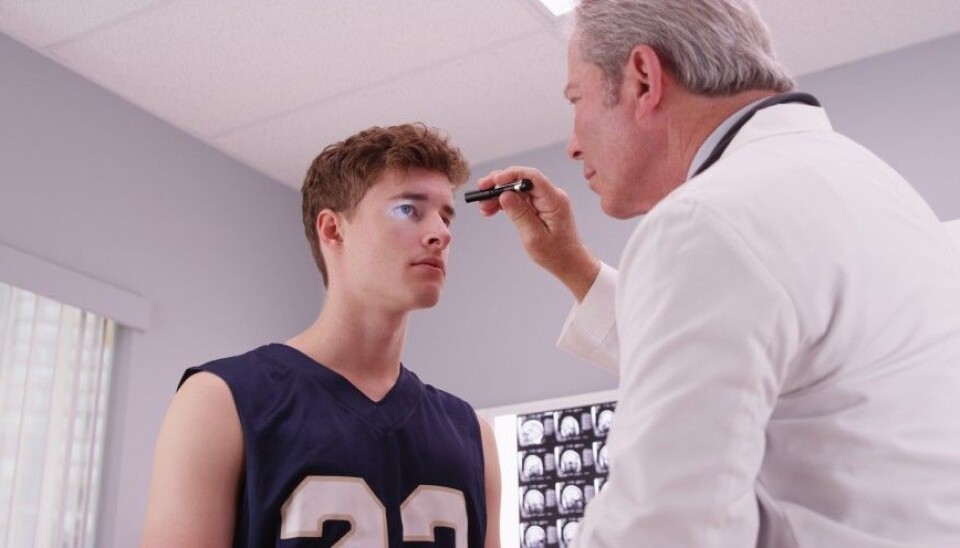
Traumatic brain injuries linked to dementia risks
A person who has suffered a brain injury is more likely to develop dementia. The worse the injury the greater the risk, shows a new Swedish study.
The connection between traumatic brain injury (TBI) and dementia has been investigated extensively. Some studies have indicated a clear connection but researchers have not ascertained that the blows to the head are what increased the risk for dementia.
People get such injuries from falling, participating in contact sports, getting in traffic accidents or being the victims of violence.
Swedish researchers now think they have found a clear link.
Researchers at Umeå University have used data from Statistics Sweden and the National Patient Register and they could look at the entire Swedish population. The register was searched for all cases of brain traum and dementia from 1964 to 2012.
In other words, access to the register enabled the researchers to evaluate all cases of persons who sought medical treatment for light, moderate and severe head trauma for nearly 50 years.
These were compared with persons who did not suffer such head injuries.
The harder hit, the greater the risk
The association between TBI and dementia was more frequent in accordance to the severity of the injury.
The researchers also showed that the link was strongest during the first four years after the injury. The risk of dementia is then four to six times greater than for persons who have not suffered such brain injuries. Then the risk starts to drop considerably. But people still run a higher risk of dementia than those who have not incurred such injuries even 30 years after the TBI happened.
Health registers provide better research
Anna Nordström is the first author in the new study.
She points out that plenty of researchers have studied the connection between TBI and dementia. However, their results have differed substantially.
Nordström thinks the Swedish study is the strongest published on this subject to date because it is so extensive, covering so many persons for such a long time.
“The health registers we have in Sweden and Norway give us a unique opportunity to study connections. It really bolsters our research,” she says.
Intriguing – with limitations
Ingunn Rise Kirkeby is a chief physician in the Neurological Department at Oslo University Hospital, Rikshospitalet. She is impressed by the size of the study and finds it intriguing, but adds that it has its limitations.
Scores of studies have attempted to answer the question of whether head injuries can raise the risk later in life of developing dementia. The results have been inconclusive, inasmuch as they have differed in structure and pointed in different directions. Unfortunately, she thinks the new study has not come up with a definitive answer about the relationship between brain trauma and dementia.
Aftereffects of moderate and severe brain trauma can get patients diagnosed with dementia.
“This will contribute to an apparent increase in dementia diagnoses among patients with brain traumas. A possible source of error would also be that preliminary, undiagnosed dementia could make people more disposed to suffering brain trauma,” she says.
In other words, early dementia could raise the risk of accidents and falls.
Stronger than other studies
Nordström asserts that previous studies have been hampered by numerous limitations.
“We have followed a large population for up towards 50 years. Thus, we have avoided some of the problems of studies that have only followed persons for a few years. It is hard to determine the cause if someone has a bad fall and gets dementia a few years later. Which came first?
Perhaps the person was in the process of developing dementia when they fell. When we follow persons over so many years we are more likely to circument these uncertainty factors.”
The Swedish researchers have also compared siblings. Dementia is hereditary, and heredity is a factor that complicates research on head injuries and dementia. So the Swedes looked at siblings where one had suffered TBI and the other hadn’t.
They found a clear disparity between the two groups. Those who had suffered such injuries more often developed dementia than their brothers or sisters who had not had such injuries.
Other explanations
Ingunn Rise Kirkeby is intrigued by the Swedish study but is not fully convinced by it that head trauma is a cause of dementia. (Private photo)
Kirkeby thinks there can be underlying causes which explain why the researchers find a link between TBI and dementia.
“The study tells us that it is somewhat more common for persons with dementia to have had a traumatic brain injury than for a person who is not demented to have suffered one. The link is strongest for severe brain traumas.”
But she asserts that the study is not showing with certitude that such head injuries are the cause of dementia later on.
“The result can just as easily be attributed to other factors which cause a higher frequency of both brain injurie and dementia.”
Many with high blood alcohol contents
Kirkeby says that overuse of drugs and alcohol comprises a common factor for traumatic brain injuries and for dementia, and for that reason alone one can expect more people who had TBIs to later develop dementia.
It has been shown in studies that 40–80 percent of patients with head injuries have high blood alcohol levels at the time of the accident. Kirkeby says around 40 percent of these patients are heavy users of alcohol before they injured themselves.
“For us who work with head injuries it is obvious that intoxication is such a dominant cause of head injuries that it comes as no surprise there is a disproportionate frequency of dementia in this group – whether or not the traumatic brain injury is a contributing factor.”
Not all sports are healthy
There are all sorts of ways people can incur head trauma. Anna Nordström points out that not all of these injuries can be prevented.
“Our research is based on all types of injuries that have been severe enough to for a person to seek or receive medical assistance. For example, he or she might have taken a fall in a soccer match or been in a skiing or traffic accident.”
It is not as easy to prevent a road accident as it is with sports accidents.
She thinks our knowledge of the risks should make us more cautious regarding where we place limits for what is okay in sports.
“Engaging in sports is undoubtedly good, but the risks need to be weighed against the advantages. Boxing is an example of a field where this is worth discussing,” says Nordström.
Boxing linked to dementia
Ingunn Rise Kirkeby is also a sports medicine specialist and a member of the so-called knockout board in Norway, the board involved with permits for organised martial arts that accept knockouts. She has warned against boxing.
She thinks there is a definite link between boxing and dementia.
“The occurrence of early dementia is 200–400 times more frequent among professional boxers than among the rest of the population,” said Kirkeby the Norwegian publication Dagens Medisin in 2014.
-------------------------------------
Read the Norwegian version of this article at forskning.no.
Translated by: Glenn Ostling






